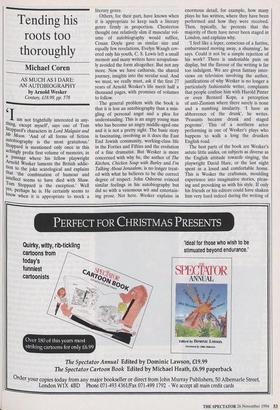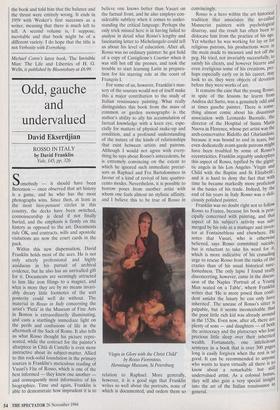Tending his roots too thoroughly
Michael Coren AS MUCH AS I DARE: AN AUTOBIOGRAPHY by Arnold Wesker Century, £18.99, pp. 578 I. am not frightfully interested in any- thing, except myself, says one of Tom Stoppard's characters in Lord Malquist and Mr Moon 'And of all forms of fiction autobiography is the most gratuitous.' Stoppard is mentioned only once in this achingly prolix first volume of memoirs, in a passage where his fellow playwright Arnold Wesker laments the British addic- tion to the joke scatological and explains that 'the combination of humour and intellect seems to have died with Shaw. Tom Stoppard is the exception.' Well Yes, perhaps he is. He certainly seems to know when it is appropriate to mock a literary genre.
Others, for their part, have known when it is appropriate to keep such a literary genre firmly in proportion. Chesterton thought one relatively slim if muscular vol- ume of autobiography would suffice, Conan Doyle gave us similar size and equally few revelations, Evelyn Waugh cov- ered only his youth, C. S. Lewis left a small memoir and many writers have scrupulous- ly avoided the form altogether. But not any more. Now we have catharsis, the shared journey, insights into the secular soul. And we must, we really must, ask if the first 27 years of Arnold Wesker's life merit half a thousand pages, with promises of volumes to follow.
The general problem with the book is that it is less an autobiography than a min- gling of personal angst and a plea for understanding. This is an angry young man who has become an angry middle-aged one and it is not a pretty sight. The basic story is fascinating, involving as it does the East End Jewish community, working-class life in the Forties and Fifties and the evolution of a fine dramatist. But Wesker is more concerned with why he, the author of The Kitchen, Chicken Soup with Barley and I'm Talking About Jerusalem, is no longer treat- ed with what he believes to be the correct degree of respect. John Osborne evinced similar feelings in his autobiography but did so with a venomous wit and entertain- ing prose. Not here. Wesker explains in enormous detail, for example, how many plays he has written, where they have been performed and how they were received. Then, typically, he protests that the majority of them have never been staged in London, and explains why.
`I feel like a leper, conscious of a furtive, embarrassed moving away, a shunning', he says. Could it not be a simple rejection of his work? There is undeniable pain on display, but the flavour of the writing is far too indulgent. We are given fantasy inter- views on television involving the author, justifications of why Wesker is no longer a particularly fashionable writer, complaints that people confuse him with Harold Pinter or even Bernard Kops, a perception of anti-Zionism where there surely is none and a numbing insularity. 'I have an abhorrence of the drunk', he writes. `Peasants became drunk and staged pogroms'. This of a northern actor performing in one of Wesker's plays who happens to walk a long the drunken English road.
The best parts of the book are Wesker's astute little asides, on subjects as diverse as the English attitude towards singing, the playwright David Hare, or the last night spent in a loved and comfortable home. This is Wesker the craftsman, moulding experience into imaginative stories, pleas- ing and provoking us with his style. If only his friends or his editors could have shaken him very hard indeed during the writing of the book and told him that the balance and the thrust were entirely wrong. It ends in 1959 with Wesker's first successes as a writer, meaning that there is much left to tell. A second volume is, I suppose, inevitable and that book might be of a different variety. I do hope that the title is not Verbosity with Everything.
Michael Coren's latest book, The Invisible Man: The Life and Liberties of H. G. Wells, is published by Bloomsbury at £6.99.











































































 Previous page
Previous page